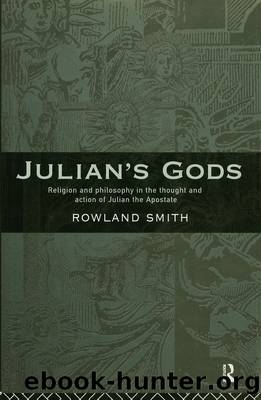Julian's Gods by Rowland B. E. Smith

Author:Rowland B. E. Smith [Smith, Rowland B. E.]
Language: eng
Format: epub
ISBN: 9781134677535
Barnesnoble:
Publisher: Taylor & Francis
Published: 2013-04-15T00:00:00+00:00
The Cults of Mithras and Cybele and the Gods of the Roman State
There remains a final major issue to consider: the place accorded by Julian to the Mithraic and Metroac cults in his imperial policy and practice. Here too, I will argue, the cults present contrasting cases. It will be best, however, to treat the question without recourse to what has been said about the relation of Julianâs Mithraic and Metroac interests to the ideological basis of the hymns: there, our concern lay with the private man, with his theurgy and his cultured interests as an exegete; here, it lies with a political programme of pagan restoration and the role of the two cults in it.
It is an old idea that the value Mithraism put on energy and exertion in the face of difficulties made a strong appeal to Roman sensibilities. At first sight, that might seem to make it a plausible instrument of imperial policy and publicity. Cumont had no doubts on that score, and allotted the cult a clear political significance in the third and fourth centuries. In his Mystères de Mithra, he gave a chapter over to âMithra et le pouvoir impérialâ. He argued that from the time of Commodus onwards, the Emperors tended to extend protection and special favour to Mithraism â in which connection he picked out in particular the reigns of Aurelian, the Tetrarchs and Julian. And in his view, their âfaveur constanteâ could not be put down to a passing vogue or to individual preferences: the cult found a place in imperial ideology because it answered to a political need; the Emperors found in its doctrines âun appui pour leur politique personnelle et un soutien pour les prétensions autocratiquesâ.109 Two doctrines in particular, Cumont believed, played a part in the development of the style of imperial government that Rostovtzeff was to call the âOriental Despotismâ. First, a concept of a divine grace that legitimated and increased the power of âtrueâ princes, and brought about the ruin of pretenders and usurpers. This conception â so the argument ran110 â added resonance and depth to a notion already established in imperial ideology in the guise of the Fortune of the Emperor, and was to be linked with the adoption of such titles as Felix and Invictus: it affirmed that the ultimate proof of a rulerâs worth was his success â above all else, his success in war. And Cumont believed that a second âMithraicâ doctrine, to do with the pre-existence of souls and the manner of their descent to earth, further emphasized the association of Emperors with gods, enhancing imperial claims to divinity by its implication that the descending soul of a king was invested with power by the sun and so became its earthly representative.111
It will be evident from my earlier outline of the direction Mithraic studies have taken since Cumont was writing that these arguments are open to serious doubt.112 The first takes for granted an untestified transposition into Western Mithraism of a
Download
This site does not store any files on its server. We only index and link to content provided by other sites. Please contact the content providers to delete copyright contents if any and email us, we'll remove relevant links or contents immediately.
Harry Potter and the Goblet Of Fire by J.K. Rowling(3075)
Unfinished: A Memoir by Priyanka Chopra Jonas(2918)
Never by Ken Follett(2905)
Machine Learning at Scale with H2O by Gregory Keys | David Whiting(2316)
The Man Who Died Twice by Richard Osman(2307)
Fairy Tale by Stephen King(2090)
Will by Will Smith(2061)
Rationality by Steven Pinker(1773)
The Storyteller by Dave Grohl(1667)
The Dark Hours by Michael Connelly(1578)
The Dawn of Everything: A New History of Humanity by David Graeber & David Wengrow(1577)
The Stranger in the Lifeboat by Mitch Albom(1547)
Cloud Cuckoo Land by Anthony Doerr(1446)
New Morning Mercies: A Daily Gospel Devotional by Paul David Tripp(1373)
Friends, Lovers, and the Big Terrible Thing by Matthew Perry(1342)
The Becoming by Nora Roberts(1337)
Crying in H Mart by Michelle Zauner(1326)
Einstein: His Life and Universe by Walter Isaacson(1320)
A Short History of War by Jeremy Black(1304)
